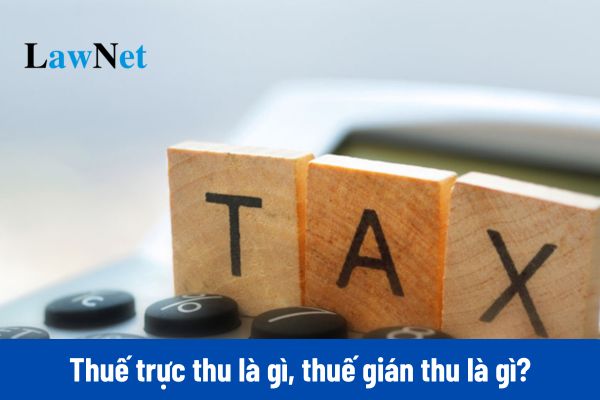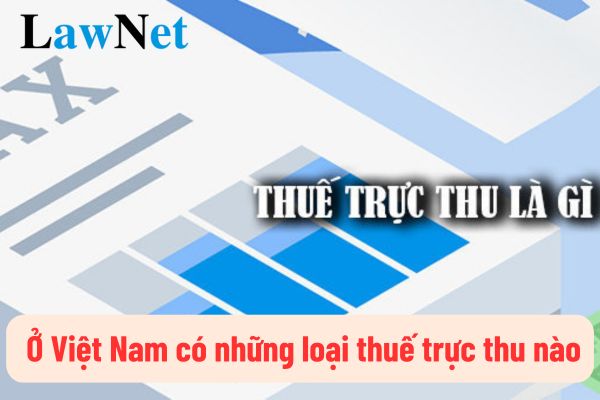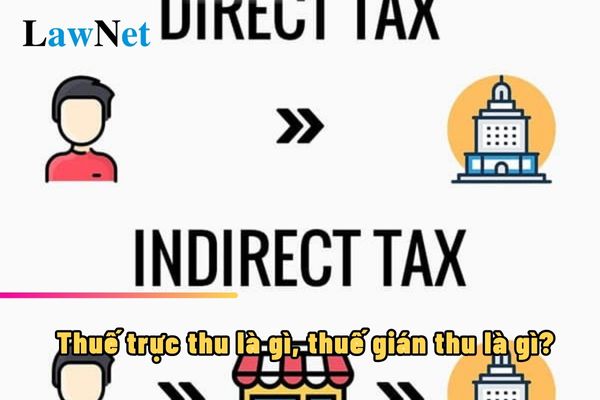What is direct tax? what is indirect tax? Which taxes are considered direct taxes in Vietnam?
Vietnam: What is direct tax? what is indirect tax?
Currently, the terms direct tax and indirect tax do not have any detailed legal documents defining and explaining taxable terms. However, based on tax laws such as: Personal Income Tax Law 2007; Corporate Income Tax Law 2008; Excise Tax Law 2008; Value Added Tax Law 2008, etc., these definitions can be understood as follows:
(1) direct tax: Taxes directly collected by the State into the budget from a portion of the taxable income of the tax subject, meaning the individual paying direct tax uses a portion of their income to pay the State.
direct tax is not an independent type of tax within the tax system. direct tax is identified by determining who is actually bearing the tax. The taxpayer is also the tax bearer.
(2) indirect tax: This is the tax collected from consumers through the business or production entities who pay the tax.
This type of tax functions to regulate social consumption.
It is added to the price of goods or services. The purpose of indirect tax is to target consumption. The taxpayer is the business entity, not the one who bears the tax, so it is called indirect tax. indirect taxes are easier to adjust upward than direct taxes, thus having a trend of being favored over direct taxes in many countries.
Current types of indirect taxes include:
- Environmental Protection Tax: Environmental Protection Tax Law 2010
- Value Added Tax: Value Added Tax Law 2008
- Excise Tax: Excise Tax Law 2008
- Import and Export Tax: Import and Export Tax Law 2016
- Royalties: Royalties Law 2009

Vietnam: What is direct tax? what is indirect tax? (Image from the Internet)
Which taxes are considered direct taxes in Vietnam?
direct taxes include taxes directly collected based on the income of the taxpayer. The types of taxes collected based on the taxpayer's income are as follows:
(1) Personal Income Tax:
According to Article 2 of the Personal Income Tax Law 2007 regarding taxpayers:
Taxpayer
- Personal income tax is applicable to residents with taxable income specified in Article 3 of this Law arising both within and outside the territory of Vietnam, and non-residents with taxable income specified in Article 3 of this Law arising within the territory of Vietnam.
- A resident is an individual who meets one of the following conditions:
a) Present in Vietnam for 183 days or more within a calendar year or within 12 consecutive months from the first day of presence in Vietnam;
b) Having a regular residence in Vietnam, including a registered permanent residence or renting a house for stay in Vietnam under a lease contract with a term.
- A non-resident is an individual not meeting the conditions specified in clause 2 of this Article.
(2) Corporate Income Tax:
According to Article 2 of the Corporate Income Tax Law 2008 (amended and supplemented by clause 1, Article 1 of the Amended Corporate Income Tax Law 2013) regarding corporate income tax payers:
Taxpayer
- Corporate income taxpayers include organizations engaged in production, business operations with taxable income as prescribed by this Law (hereinafter referred to as enterprises), including:
a) Enterprises established under Vietnamese law;
b) Enterprises established under foreign law (hereinafter referred to as foreign enterprises) with or without a permanent establishment in Vietnam;
c) Organizations established under the Cooperative Law;
d) Non-business units established under Vietnamese law;
dd) Other organizations engaged in production and business operations with taxable income.
- Enterprises with taxable income as specified in Article 3 of this Law must pay corporate income tax as follows:
a) Enterprises established under Vietnamese law pay tax on taxable income arising within and outside Vietnam;
b) Foreign enterprises with a permanent establishment in Vietnam pay tax on taxable income arising within and outside Vietnam related to the activities of such establishment;
c) Foreign enterprises with a permanent establishment in Vietnam pay tax on taxable income arising within Vietnam unrelated to the activities of such establishment;
d) Foreign enterprises without a permanent establishment in Vietnam pay tax on taxable income arising within Vietnam.
- A permanent establishment of a foreign enterprise in Vietnam is a production and business establishment through which the foreign enterprise conducts part or all of its production and business activities in Vietnam, including:
a) Branches, management offices, factories, plants, means of transportation, oil rigs, gas rigs, mines or any location of natural resource extraction in Vietnam;
b) Construction sites, construction, installation or assembly projects;
c) The provision of services, including consultancy services through employees or other organizations or individuals;
d) Acts as an agent for the foreign enterprise;
dd) Represents the foreign enterprise in Vietnam with the authority to sign contracts on behalf of the foreign enterprise or, without such authority, regularly carries out the delivery of goods or provision of services in Vietnam.
The two types of taxes mentioned above are identified as direct taxes collected based on the income of the taxpayer. Hence, personal income tax and corporate income tax are considered direct taxes.
Which incomes are exempted from direct tax for personal income tax in Vietnam?
According to Article 4 of the Personal Income Tax Law 2007 (amended and supplemented by clause 3, Article 2 of the Amendment of Laws on Taxation 2014 and clause 2, Article 1 of the Amended Personal Income Tax Law 2012), the following incomes are exempted from direct tax in the form of personal income tax:
- Income from real estate transfers between spouses; biological parents with biological children; adoptive parents with adopted children; parents-in-law with daughters-in-law; parents-in-law with sons-in-law; paternal grandparents with grandchildren; maternal grandparents with grandchildren; siblings with each other.
- Income from the transfer of residential houses, rights to use homestead land and assets attached thereto of individuals in cases where the individual has only one house, homestead land.
- Income from the value of land use rights allocated by the State to individuals.
- Income from inheritance or gifts of real estate between spouses; biological parents with biological children; adoptive parents with adopted children; parents-in-law with daughters-in-law; parents-in-law with sons-in-law; paternal grandparents with grandchildren; maternal grandparents with grandchildren; siblings with each other.
- Income of households or individuals directly engaged in agricultural production, forestry, salt production, aquaculture without any processing into other products or only simple processing.
- Income from the exchange of agricultural land allocated by the State for production by households or individuals.
- Income from interest on deposits at credit institutions, interest from life insurance contracts.
- Income from remittances.
- Night shift wages or overtime wages paid higher than daily wages, wages within the hours as provided for by law.
- Retirement pensions paid by the social insurance fund; monthly retirement pensions paid by voluntary pension funds.
- Income from scholarships, including:
+ Scholarships granted by the state budget;
+ Scholarships granted by domestic and foreign organizations under their scholarship support programs.
- Income from indemnities for life insurance, non-life insurance contracts, compensation for occupational accidents, state compensation, and other compensations as prescribed by law.
- Income received from charitable funds authorized by state agencies established or recognized, operating for charitable, humanitarian purposes, not for profit.
- Income received from foreign aid for charitable, humanitarian purposes under government and non-governmental forms approved by competent state agencies.
- Income from wages or salaries of seafarers who are Vietnamese nationals working for foreign or Vietnamese shipping companies on international voyages.
- Income of individuals who are vessel owners, individuals having the right to use vessels, and individuals working on vessels from direct provision of goods and services for offshore fishing and catching activities.



- What are Answers to Round 3 of the Contest on Learn about the 95th Anniversary of the Founding of the Communist Party of Vietnam and the History of the CPV Committee of Quang Ninh Province?
- How to calculate benefits for those retiring early upon downsizing in Vietnam? Is the retirement allowance subject to PIT?
- What is the initial licensing fee declaration form in Vietnam in 2025? How to complete the 2025 licensing fee declaration?
- What is the schedule of fees for chemical affairs in Vietnam? What are regulations on the management and use of fees in chemical affairs in Vietnam?
- What are the slaughtering control fees in veterinary in Vietnam? Are livestock farms subject to environmental protection fees in Vietnam?
- What are instructions for completing the tax declaration for fixed tax payers changing tax calculation methods in Vietnam (Form 01/CNKD)?
- How to determine the 2025 Tet bonus fund for Vietnamese officials and public employees according to Decree 73? Are 2025 Tet bonuses for Vietnamese officials and public employees taxable?
- What is the 2025 Tet holiday schedule for Shopee couriers in Vietnam? Shall goods under 1 million VND sent via express delivery to Vietnam not be exempted from import duty?
- What is the fixed asset liquidation minutes form in Vietnam according to Circular 200/2014?
- How to calculate benefits for Vietnamese tax officials retiring early in 2025?

